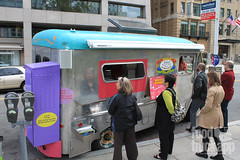Mobile food vending under attack by Dupont Circle Merchants and Professionals Association
In July, DC MAP commented on proposed vending regulations in a letter to the DC Department of Consumer and Regulatory Affairs. They made an important point in that the proposed regulations weren't really designed to cover mobile vending, and that separate regulations should be created for mobile vendors, and until those regulations are created, that mobile vending should be suspended.
The letter was communicated to the Eastern Market Community Advisory Committee (on which I sit) for possible consideration. Below is my response.
-------
While I think that DC MAP makes an excellent point that mobile food vending should be covered under a different set of regulations than fixed-site food vending, and that such regulations should be developed and implemented, I disagree with their recommendation/plea that all mobile vending be suspended in the meantime, in the period before new legislation and regulations are created.
In traffic and transportation matters, there are a number of manuals that guide professional practice and Federal Highway Administration reimbursement, primarily the Manual for Uniform Traffic Control Devices (MUTCD). The MUTCD is often codified with additional regulations at the state level into state-specific manuals. Practices codified in the MUTCD can be employed by sub-jurisdictions with the certainty that they comport with professional practices, that they will meet terms for reimbursement from federal funds, etc.
At the same time, FHWA and the states have a procedure whereby "states" can petition to construct "treatments" that are not covered in the MUTCD, but are considered experimental or innovative, with the requirement that the before and after impact be studied, that the treatments are not permanent, and that the research conducted be used by the jurisdiction for program improvement, as well as be provided to the FHWA for consideration and dissemination through the research and innovation practice networks supported by the FHWA. In DC, cycletrack treatments on Pennsyvlvania Avenue and 15th Street NW are covered by this, and therefore able to use federal funds in their construction, as the MUTCD has not yet incorporated standard treatments for this particular form of bicycle infrastructure. In return, DDOT studies the implementation of the cycletrack, makes modifications as needed, and reports on the impact to the FHWA.
DC should act similarly with regard to mobile vending.
Mobile vending should not be banned pending a specific set of regulations for it. Instead, "innovation zones" where mobile vending can occur should be "promulgated" and a "research protocol" developed and implemented so that the practice can be monitored and studied and modified in advance of the creation of high quality management and regulatory procedures. (Such an iterative process is more common to the "design method" than the traditional and more static, less dynamic, "rational planning" model.)
Mobile vending is a sign of active, vital places, and should be encouraged. On the other hand, mobile vending needs to be managed and regulated so that it contributes in a variety of ways to commercial districts, without impinging on extant businesses or creating traffic and other problems.
It happens that I wrote about this earlier in the week.
Commercial district revitalization organizations such as DC MAP have conflicting roles. They are advocates for merchants. At the same time they are supposed to be planners and managers concerned with maintaining the vitality and relevance of their commercial district. Sometimes the interests of merchants and the needs involved in refreshing and maintaining commercial district vitality can be conflicting.
All too frequently, commercial district revitalization organizations such as the Dupont Circle Merchants and Professional Association neglect their broader responsibilities for commercial district revitalization planning and marketing in favor of the often pecuniary, picayunish, and short-sighted interests of merchants and other stakeholders.
I believe that is the case with regard to the opposition by DC MAP and other commercial district revitalization organizations (such as in Adams-Morgan) to mobile vending.
Such behavior should be discouraged rather than encouraged, and ideally, commercial district revitalization organizations in Capitol Hill should endeavor to consider the issue more broadly than is presently occurring elsewhere in the city.




0 Comments:
Post a Comment
<< Home